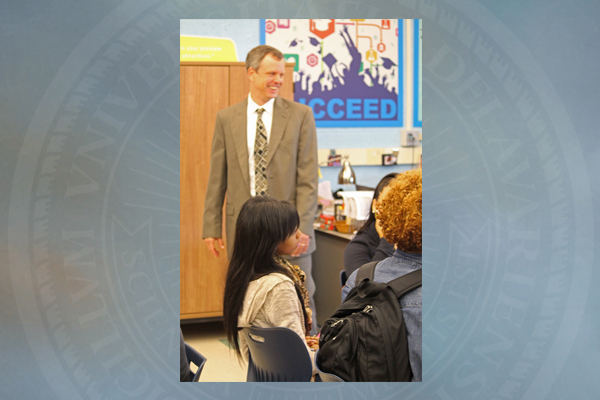School of Education
Ed.D. alumnus applies research to reduce senior dropout rate

In June 2005, only 385 seniors at William Penn High School in New Castle, Delaware, graduated. Fifty-five students, or 12 percent of the 440-student senior class failed to graduate, even though these students had successfully completed the prior three years of high school.
Ten years later, the graduation rate of seniors has increased to 97 percent due to the work of Jeffrey D. Menzer, now director of schools in the Colonial School District, and his colleagues at William Penn.
“The graduating class of 2015 was historic,” said Menzer. “In May, there were 480 seniors in our high school. In June, 464 students earned their diplomas. Only 16 students were lost at the last minute. That’s 3 percent of the senior class.”
As a doctoral student at University of Delaware, Menzer was alarmed by the dropout rate of his senior students at William Penn, the largest high school in Delaware, where he served as principal. He focused his research on studying the characteristics of non-graduating seniors in order to address the problem.
Menzer found that most non-graduating seniors fell into one of the four categories:
- Overwhelmed students who encountered significant and unexpected personal challenges during their senior year, such as homelessness, mental illness or pregnancy;
- Lackadaisical students who erroneously believed that they could pass their remaining classes with little effort;
- Struggling students who wanted to succeed, but faced academic difficulties; and
- Surprised students who unexpectedly failed a course in their final year.
Menzer offered recommendations for supporting these students, and William Penn implemented several initiatives, including:
- Increasing the supply of information to parents, students and teachers. The guidance staff at William Penn now communicates senior credit needs with school staff and has increased the time they spend with students and parents through one-on-one conferences, assemblies and evening events.
- The creation of a credit recovery lab. Through self-paced online courses, at-risk students at William Penn can earn missing credits. Students may also receive counseling from trained dropout prevention specialists.
- The reorganization of the high school’s curriculum around college-like degree programs that emphasize real-world experience and technical training.
“We redesigned the school around three academies, which include the business, humanities and STEM (science, technology, engineering and mathematics) colleges. Ninth graders now apply to a degree program that follows a course sequence and challenges students to earn 32 total credits, exceeding the state requirements,” said Menzer. “These classes are engaging – our ROTC ground flight class has students flying planes from a local airport.”
The school also partnered with William Lewis and Sharon Walpole, professors in UD’s School of Education, to integrate literacy across content areas in ninth and tenth grades. This three-year partnership led to a series of interventions designed to strengthen students’ reading comprehension and ability to access complex texts.
In the first year, a small group of teachers attended monthly training sessions with Lewis and Walpole on a range of topics including understanding text difficulty, building background knowledge and teaching reading strategies.
In the second year, Walpole worked with a pilot group of students and teachers, observing instruction, making recommendations and creating online literacy modules.
In the third year, Menzer created a new instructional coaching position. Jake Nagy, a member of the original pilot team, trained the rest of the ninth and 10th grade teams at William Penn and has continued this work.
As a result of this partnership, William Penn’s 11th graders ranked 13th in the state in their Smarter Balanced Assessment Consortium (SBAC) scores for English Language Arts. This ranking is impressive, given that the same group of students had ranked 27th in the state for its Delaware Comprehensive Assessment System (DCAS) scores in the previous year, and the SBAC exam is considered to be significantly more challenging.
“Jeff Menzer is really forward-thinking, and he’s not a delegator. I have personally seen him unpack boxes of assessment materials, train assistant principals on teacher observation and work to locate every single student that may not graduate,” said Walpole. “Students who are at risk frequently move, and Jeff works to either get the students back to William Penn, enroll them in a new school, or help their parents understand the paperwork requirements for moving schools.”
Menzer, who earned a bachelor’s degree in history education in 1991, a master’s degree in curriculum and instruction in 1997, and a doctorate in educational leadership in 2007, credits his training at UD for his success, as well as the initiatives underway at his school. He completed his doctoral degree under the advisement of Robert Hampel, professor of history education in the School of Education.
“I believe the success of this 10-year effort was the direct result of our ability to integrate a variety of strategies across multiple areas of school life and remain dedicated in order to achieve a common goal: reduce the number of students lost at the last minute to zero,” said Menzer.
In light of the success at William Penn, Colonial School District is expanding these strategies to include its three middle schools so that drop-out prevention may begin even earlier.
Article by Jessica Henderson
Please see the UDaily article here.



